Karolina Hird, Christina Harward, Grace Mappes, Nicole Wolkov, and Mason Clark
Ukrainian forces continued counteroffensive operations near Bakhmut and advanced in western Zaporizhia Oblast on October 6. Ukrainian military sources noted that Ukrainian forces continued successful offensive actions south of Bakhmut near Andriivka (8km southeast of Bakhmut).[1] Geolocated footage posted on October 5 shows that Ukrainian forces have advanced towards a tree line between Robotyne and Verbove, about 6km southeast of Robotyne.[2] Ukrainian Eastern Group of Forces Spokesperson Captain Ilya Yevlash noted that Ukrainian forces are preparing for offensive operations throughout the autumn-winter period. Yevlash emphasized that while supply requirements will increase and rainy and foggy conditions may complicate the use of drones and tactical and army aviation, Ukrainian forces will continue to fight through the winter.[3] Yevlash’s statement supports ISW’s longstanding assessment that weather will not prevent either side from conducting offensive operations throughout the winter of 2023-2024 if they are well-supplied and choose to do so, as they did in the winter of 2022, and that the pace of Ukrainian offensives will largely be metered by Western provision of appropriate small-arms and ammunition and non-lethal supplies to Ukraine - not simply winter weather conditions or any specific weapons system.[4]
Russian forces appear to have recently conducted a regimental rotation in the Orikhiv area, demonstrating an ability to sustain their defenses in this critical sector of the frontline. A Ukrainian military observer reported on October 6 that elements of the 291st Motorized Rifle Regiment (42nd Motorized Rifle Division, 58th Combined Arms Army, Southern Military District), which were recently “partially restored,” withdrew to positions east of Nesteryanka (about 10km northwest of Robotyne) after the Russian command previously committed them to the area.[5] The Ukrainian observer also suggested that elements of the 71st Motorized Rifle Regiment (also of the 42nd Motorized Rifle Division) are ”persistently” counterattacking on the northern outskirts of Novoprokopivka (2km south of Robotyne).[6] ISW observed in mid-September that critical elements of the 42nd Motorized Rifle Division, particularly its 291st and 71st Motorized Rifle Regiments, withdrew behind the Russian defensive line between Verbove and Solodka Balka (about 5km south of Robotyne) due to casualties that may have rendered them combat ineffective.[7] Following the withdrawal of elements of the 42nd Motorized Rifle Division to rear areas in western Zaporizhia Oblast, elements of the 7th and 76th Airborne (VDV) divisions laterally redeployed to the area from Kherson and Luhansk oblasts to fill in the gaps left by 42nd Motorized Rifle Division elements.[8] By late September, ISW observed elements of the 42nd Motorized Rifle Division apparently recommitting to the front near Novoprokopivka, suggesting that they rotated back to the front after resting and reconstituting for a short time.[9] The Ukrainian military source’s observations about the 291st and 71st Motorized Rifle Regiments, as well as increased recent Russian reporting of these regiments defending against Ukrainian attacks in the areas south and west of Robotyne, suggest that Russian forces have conducted regiment-level rotations in this sector of the front over the past month.[10] ISW previously assessed that Russian forces were likely struggling to conduct tactical to operational level rotations along the entire frontline, but is revising this assessment considering the apparent rotation of substantial elements of the 42nd Motorized Rifle Division and two VDV divisions to and from the frontline south of Orikhiv.
Russian forces reportedly resumed an offensive effort near Kupyansk on October 6, but the majority of the Russian forces reportedly deployed to this sector of the front likely remain combat ineffective. Ukrainian military officials reported a decrease in Russian activity near Kupyansk in recent weeks, but Ukrainian Eastern Group of Forces Spokesperson Captain Ilya Yevlash stated on October 6 that Russian forces resumed combat operations in the Kupyansk-Lyman direction.[11] Russian milbloggers claimed that Russian forces launched an offensive push near Synkivka (8km northeast of Kupyansk) and that Russian forces are heavily shelling the N26 (Shevchenkove-Kupyansk) highway.[12] One milblogger characterized the renewed Russian offensive push towards Kupyansk as “large-scale” in a now-deleted post.[13] Ukrainian Main Military Intelligence Directorate (GUR) Head Lieutenant General Kyrylo Budanov previously reported that the Russian military deployed elements of the newly formed 25th Combined Arms Army (CAA) (reportedly formed under the Eastern Military District) to the Kupyansk direction to replace elements of the 41st CAA (Central Military District).[14] The resumption of Russian offensive operations near Kupyansk, possibly including elements of the 25th CAA, is likely intended to draw Ukrainian attention away from other sectors of the front in southern Ukraine. ISW previously assessed, however, that the 25th CAA was hurriedly deployed ahead of an intended deployment date of December 2023 and is likely severely understaffed, poorly trained, or both.[15] ISW has also previously observed the presence of heavily degraded Western Military District (WMD) elements, particularly of the 1st Guards Tank Army and 6th Combined Arms Army, in the Kupyansk area, and ISW does not assess at this time that a grouping comprised of the newly formed 25th Combined Arms Army with degraded WMD elements will be able to sustain meaningful offensives in this area.[16]
Russian forces may be expanding military training infrastructure in occupied eastern Ukraine as part of ongoing efforts to increase the training and mobilization capacity of the Russian military. A Ukrainian reserve officer published satellite imagery on October 5 showing that Russian forces are expanding multiple training facilities in rear areas in occupied Donetsk and Luhansk oblasts, including near Novopavlivka in occupied Luhansk Oblast.[17] The Ukrainian reserve officer stated that Russian forces are likely attempting to alleviate logistical bottlenecks and improve infrastructure to support continued mobilization and training.[18] Russian forces may be expanding training infrastructure in rear areas of occupied eastern Ukraine as part of the effort to establish nine reserve regiments, as well as ”self-sufficient” force groupings, in occupied areas of Ukraine as part of ongoing large-scale military reforms.[19] ISW assessed with low confidence that the nine reserve regiments undergoing training may be training regiments through which Russian volunteers could flow on their way to the front.[20] The Russian military may also be expanding bases in occupied Luhansk and Donetsk oblasts as part of ongoing efforts to integrate and formalize Donetsk and Luhansk People’s Republic forces within the Russian military and to increase the self-sufficiency of Russian groupings in occupied Ukraine by establishing forward training and C2 infrastructure in occupied Ukraine, rather than running operations in Donetsk and Luhansk from the Southern Military District itself.[21]
The Kremlin’s continued attempts to deflect blame for the crash of Wagner financier Yevgeny Prigozhin’s plane and disgrace Prigozhin are generating continued praise for Prigozhin and efforts to defend his legacy among select information space communities. Pro-Wagner and Wagner-affiliated channels largely lampooned Putin’s suggestion on October 5 Prigozhin’s plane crashed due to grenades detonating onboard, possibly due to the passengers using alcohol or drugs onboard.[22] Some channels called Putin’s claims “laughable,” “a farce,” and disrespectful to “heroes” of Russia.[23] A Russian insider source claimed that members of the Russian Presidential Administration ”provoked” Putin to deliver these statements in order to “de-heroize” Prigozhin, since Prigozhin’s previous statements questioning the reasons for the start of the war in Ukraine are apparently gaining popularity throughout Russia.[24] Putin’s comments do not appear to have had the intended effect and have instead pushed some elements of the Russian information space to attempt to preserve Prigozhin’s reputation and disprove Putin‘s implication that Prigozhin was to blame for the plane crash by continuing to discuss Prigozhin and criticize the Kremlin’s official line on his death. However, the Kremlin’s apparent perceived need to continue to discuss Prigozhin’s death and denigrate him further is noteworthy regardless of any information space responses, indicating the Kremlin likely perceives some continuing threat from Prigozhin’s statements and stance on the war.
Former Russian military commanders who participated in the beginning of the full-scale invasion of Ukraine in 2022 reportedly remain in peripheral positions of some influence within the Russian military or defense-industrial base. A Kremlin-affiliated milblogger amplified a claim by a Russian insider source on October 6 that listed the current positions of Russian military commanders whom the Russian military leadership replaced after the initial invasion of Ukraine in 2022 failed to achieve its intended goals.[25] The source claimed that former Western Military District (WMD) Commander Colonel General Alexander Zhuravlev and former Southern Military District (SMD) Commander Army General Alexander Dvornikov are currently advisors to High Precision Complexes (a subsidiary of Rostec, Russia’s primary state-owned defense conglomerate) and the Almaz-Antey Aerospace Defense Concern (another state-owned defense enterprise), respectively. The source claimed that Dvornikov is still in “army circles” and hopes to return to the military. The source claimed that former Central Military District Commander Colonel General Alexander Lapin is currently the Chief of Staff of the Russian Ground Forces. The source claimed that former Eastern Military District (EMD) Commander Colonel General Alexander Chaiko served in Syria and the Russian General Staff after his dismissal as EMD commander but that his current position is unknown. Former United Kingdom Secretary of State for Defense Ben Wallace stated on October 1 that the Russian military leadership had removed all commanders who led major Russian units into Ukraine in February 2022.[26] These insider source claims are largely consistent with ISW’s previous observations of a pattern of Russian military leadership shifting disgraced and ineffective commanders to peripheral positions far removed from Ukraine without entirely discharging them from military or security sector government positions, leaving open the option of returning to a command position.[27]
Russian forces conducted a Shahed-131/136 drone strike targeting port, grain, and border infrastructure in southern Ukraine on the night of October 5-6. The Ukrainian General Staff reported that Russian forces launched 33 Shahed drones from Cape Chauda, Crimea and that Ukrainian air defenses shot down 25 of the drones.[28] The Ukrainian Southern Operational Command reported that the Russian strike damaged port infrastructure and a granary along the Danube River in Odesa Oblast, and geolocated footage published on October 6 indicates that the strike hit the Orlivka-Isaccea ferry crossing that connects Odesa Oblast and Romania.[29]
Key Takeaways:
- Ukrainian forces continued counteroffensive operations near Bakhmut and advanced in western Zaporizhia Oblast on October 6.
- Russian forces appear to have recently conducted a regimental rotation in the Orikhiv area, demonstrating an ability to sustain their defenses in this critical sector of the frontline.
- Russian forces reportedly resumed an offensive effort near Kupyansk on October 6, but the majority of the Russian forces reportedly deployed to this sector of the front likely remain combat ineffective.
- Russian forces may be expanding military training infrastructure in occupied eastern Ukraine as part of ongoing efforts to increase the training and mobilization capacity of the Russian military.
- The Kremlin’s continued attempts to deflect blame for the crash of Wagner financier Yevgeny Prigozhin’s plane and disgrace Prigozhin are generating continued praise for Prigozhin and efforts to defend his legacy among select information space communities.
- Former Russian military commanders who participated in the beginning of the full-scale invasion of Ukraine in 2022 reportedly remain in peripheral positions of some influence within the Russian military or defense-industrial base.
- Russian forces conducted a Shahed-131/136 drone strike targeting port, grain, and border infrastructure in southern Ukraine on the night of October 5-6.
- Russian forces continued offensive operations along the Kupyansk-Lyman line, near Bakhmut, along the Avdiivka-Donetsk City line, in the Donetsk-Zaporizhia border area, and in western Zaporizhia Oblast and advanced in some areas.
- Ukrainian forces conducted offensive operations near Bakhmut and advanced in western Zaporizhia Oblast.
- Russia has reportedly recruited up to several hundred Serbian nationals to fight in Ukraine.
We do not report in detail on Russian war crimes because these activities are well-covered in Western media and do not directly affect the military operations we are assessing and forecasting. We will continue to evaluate and report on the effects of these criminal activities on the Ukrainian military and the Ukrainian population and specifically on combat in Ukrainian urban areas. We utterly condemn these Russian violations of the laws of armed conflict, Geneva Conventions, and humanity even though we do not describe them in these reports.
- Russian Main Effort – Eastern Ukraine (comprised of two subordinate main efforts)
- Russian Subordinate Main Effort #1 – Capture the remainder of Luhansk Oblast and push westward into eastern Kharkiv Oblast and encircle northern Donetsk Oblast
- Russian Subordinate Main Effort #2 – Capture the entirety of Donetsk Oblast
- Russian Supporting Effort – Southern Axis
- Russian Mobilization and Force Generation Efforts
- Activities in Russian-occupied areas
Russian Main Effort – Eastern Ukraine
Russian Subordinate Main Effort #1 – Luhansk Oblast (Russian objective: Capture the remainder of Luhansk Oblast and push westward into eastern Kharkiv Oblast and northern Donetsk Oblast)
Russian forces conducted offensive operations along the Kupyansk-Svatove-Kreminna line on October 6 and reportedly advanced. Ukrainian Eastern Group of Forces Spokesperson Captain Ilya Yevlash stated that Russian forces resumed combat operations in the Kupyansk-Lyman direction.[30] Russian milbloggers claimed that Russian forces launched renewed offensive operations near Synkivka (8km northeast of Kupyansk) while simultaneously counterattacking in unspecified areas of the Svatove sector of the front.[31] The milbloggers claimed that Russian forces are heavily shelling the N26 (Shevchenkove-Kupyansk) highway.[32] One milblogger characterized the Russian offensive push towards Kupyansk as “large-scale” in a now-deleted post.[33] Other milbloggers claimed that Russian forces made unspecified progress northeast of Kupyansk.[34] A Russian news aggregator claimed that Russian forces advanced near Kyslivka (20km southeast of Kupyansk) and successfully attacked near Makiivka (22km northwest of Kreminna) on October 5.[35] A Russian milblogger claimed on October 6 that Russian forces attacked near Torske (15km west of Kreminna) and Makiivka but did not specify an outcome.[36] The Ukrainian General Staff reported that Russian forces unsuccessfully attacked near Synkivka, Ivanivka (20km southeast of Kupyansk), and Makiivka.[37]
The Russian Ministry of Defense (MoD) claimed that Ukrainian forces conducted unsuccessful offensive operations near Kreminna on October 6. The Russian MoD claimed that Ukrainian forces unsuccessfully attempted to recapture lost positions near Yampolivka (17km west of Kreminna), Dibrova (7km southwest of Kreminna), and Kuzmyne (3km southwest of Kreminna) and that Ukrainian forces conducted four unsuccessful attacks in the Kupyansk direction in the past week.[38]
Russian Subordinate Main Effort #2 – Donetsk Oblast (Russian objective: Capture the entirety of Donetsk Oblast, the claimed territory of Russia’s proxies in Donbas)
Ukrainian forces continued offensive operations in the Bakhmut direction and reportedly advanced south of Bakhmut on October 6. The Ukrainian General Staff reported that Ukrainian forces were successful east of Andriivka (8km southwest of Bakhmut).[39] Russian milbloggers claimed that a battalion-sized Ukrainian group attacked towards the railway line between Andriivka and Klishchiivka (6km southwest of Bakhmut) but that Russian forces defended against the attack.[40]
Russian forces conducted unsuccessful counterattacks near Bakhmut on October 6. The Ukrainian General Staff and Ukrainian Eastern Group of Forces Spokesperson Captain Ilya Yevlash reported that Russian troops unsuccessfully attempted to regain lost positions east of Dyliivka (15km southwest of Bakhmut), south of Andriivka, and near Klishchiivka.[41] A Russian milblogger claimed that Russian forces counterattacked near Andriivka, Klishchiivka, and Hryhorivka (7km northwest of Bakhmt), but did not specify the outcome of these attacks.[42] Russian sources, including the Russian Ministry of Defense (MoD), amplified footage of the 98th Guards Airborne (VDV) Division firing on Ukrainian positions in the Bakhmut direction.[43]
The Russian Ministry of Defense (MoD) claimed that Ukrainian forces conducted limited ground attacks on the Avdiivka-Donetsk City line on October 6.[44] Several Russian sources amplified footage that reportedly shows a group of around 17 Ukrainian soldiers surrendering near Marinka on the southwestern outskirts of Donetsk City.[45]
Russian forces continued ground attacks on the Avdiivka-Donetsk City line on October 6 and have recently made marginal advances. Geolocated footage posted on October 5 shows Russian positions south of Avdiivka near the E50 highway that runs along the outskirts of Donetsk City.[46] The Ukrainian General Staff reported that Russian forces conducted unsuccessful attacks near Avdiivka, Marinka, and Novomykhailivka.[47] A Russian milblogger claimed that Russian forces continued offensive operations in Marinka, resumed attacks towards Krasnohorivka and Sieverne (both on the northwestern outskirts of Donetsk City), and tried to advance on the southern approaches to Avdiivka.[48]
Russian Supporting Effort – Southern Axis (Russian objective: Maintain frontline positions and secure rear areas against Ukrainian strikes)
Ukrainian forces continued limited offensive operations in the Donetsk-Zaporizhia Oblast border area without advancing on October 6. Russian sources claimed that Russian forces repelled a Ukrainian attack near Pryyutne (16km southwest of Velyka Novosilka).[49]
Russian forces launched a series of counterattacks in the Donetsk-Zaporizhia Oblast border area on October 6 but did not make any confirmed or claimed gains. Russian sources claimed that Russian forces counterattacked towards the north and northeast of Rivnopil (8km southwest of Velyka Novosilka) and from Novomayorske (18km southeast of Velyka Novosilka).[50] Some Russian milbloggers characterized these attacks as Russian forces’ attempts to seize the initiative in the area and force Ukrainian forces to react to the Russian attacks.[51] The Ukrainian General Staff reported that Ukrainian forces repelled Russian attacks north of Pryyutne and near Staromayorske (9km south of Velyka Novosilka) and Zolota Nyva (12km southeast of Velyka Novosilka).[52] The Ukrainian General Staff also reported unsuccessful Russian ground attacks in western Donetsk Oblast near Vuhledar and Vodyane (6km northeast of Vuhledar).
A Ukrainian military observer suggested that communication issues on the command seam between headquarters of the 5th Combined Arms Army (CAA) and 36th CAA (both of the Eastern Military District) south and southeast of Velyka Novosilka is exacerbating Russian forces’ inability to make gains during localized counterattacks in this area. The military observer stated that the 127th Motorized Rifle Division and 60th Motorized Rifle Brigade (both of the 5th CAA) are tasked with defending the Staromlynivka area (14km south of Velyka Novosilka) and the Novozlatopil-Staromlynivka-Novomayorske line (25km southwest to 18km southeast of Novomayorske).[53] The military observer stated that elements of the 60th Motorized Rifle Brigade and the 394th Motorized Rifle Regiment (127th Motorized Rifle Division) have been unsuccessfully counterattacking over the past month to push Ukrainian forces to the northern outskirts of Pryyutne and that elements of the 37th Motorized Rifle Brigade (36th CAA) conducted failed attacks near Urozhaine (9km south of Velyka Novosilka) and west of Novodonetske (12km southeast of Velyka Novosilka) to pressure Ukraine’s eastern flank.
Ukrainian forces continued offensive operations in western Zaporizhia Oblast on October 6 and recently marginally advanced. Geolocated footage published on October 5 indicates that Ukrainian forces advanced to a tree line west of Verbove (18km southeast of Orikhiv).[54] The “Storm Ossetia” and “Alania” volunteer battalions operating in the area claimed that Ukrainian forces are gradually shifting the frontline closer to Verbove.[55] Russian sources claimed that small Ukrainian infantry groups continued attacking Russian positions on the Kopani-Robotyne line (up to 5km northwest of Robotyne) overnight on October 5-6 and on October 6.[56] Russian milbloggers claimed that Ukrainian forces continued attacks near Verbove and Novoprokopivka (18km southeast of Orikhiv).[57]
Russian forces continued limited unsuccessful counterattacks in western Zaporizhia Oblast on October 6. A Russian milblogger claimed that Russian forces attacked Ukrainian positions in western Robotyne.[58] Another Russian milblogger claimed that the 291st Motorized Rifle Regiment (42nd Motorized Rifle Division, 58th Combined Arms Army, Southern Military District) has been periodically counterattacking while defending against heavy Ukrainian attacks on the Kopani-Robotyne line in the past three days.[59] A Russian news aggregator claimed that Russian forces counterattacked from the Verbove direction on October 5.[60]
Russian forces likely temporarily regained and subsequently lost the sub-tactical initiative on the Ukrainian flank near Robotyne during a series of counterattacks in the past few weeks. A Ukrainian military observer reported that elements of Russian Airborne (VDV) formations have attacked Ukrainian positions on the Kopani-Robotyne and Novofedorivka-Mala Tokmachka (9-18km southeast of Orikhiv) directions in a failed attempt to alleviate pressure on Russian forces near Novoprokopivka.[61] The military observer stated that the Russian 104th VDV Regiment (76th VDV Division) instead failed to reach the outskirts of Robotyne and even lost several positions near Kopani, and that the 108th VDV Regiment (7th VDV Division) tried to drive a wedge along the T0803 but failed and had to withdraw. This report is consistent with ISW’s recent assessments that certain Russian units, including elements of the 7th VDV Division, 76th VDV Division, and 58th CAA have been consistently counterattacking in western Zaporizhia Oblast to their detriment.[62] While these Russian attacks did not capture territory, the extent (or lack thereof) of their spoiling effects on Ukrainian offensive operations is unclear.
Russian sources continue to discuss Ukrainian activity in the Dnipro River delta in Kherson Oblast. A Russian milblogger claimed that Ukrainian forces maintain positions on a narrow section of east-bank Kherson Oblast near the Antonivsky Bridge and also on Kozatskyi Island (northwest of Nova Kakhovaka).[63] Russian milbloggers expressed continued concern that limited Ukrainian raids across the river indicate that Ukrainian forces are preparing for a broader offensive effort.[64] The Russian MoD claimed that Ukrainian forces unsuccessfully tried to capture footholds on the Dnipro River delta islands in the past week.[65]
Russian Mobilization and Force Generation Efforts (Russian objective: Expand combat power without conducting general mobilization)
Russia has reportedly recruited up to several hundred Serbian nationals to fight in Ukraine. BBC’s Russia service reported on October 6 that Serbian citizens have reportedly been fighting as part of the separate “Wolf” unit of the 106th Airborne (VDV) Division since the start of the war in February 2022.[66] BBC reported that another group of 30 Serbian nationals signed contracts with the Russian Ministry of Defense (MoD) and flew to Russia to join the 106th VDV Division at an unspecified date after September 15, 2023.[67] BBC reported that a group of Serbian nationals fought in eastern Ukraine in 2014 as a part of the Wagner Group, and ISW has observed alleged Wagner recruitment efforts in Serbia in winter and spring 2023.[68] Serbian President Alexander Vucic called on the Wagner Group to cease recruitment in Serbia in January 2023, however.[69] ISW has also observed reports of Cuban and Nepalese nationals serving in Russian VDV formations, including the 106th VDV Division.[70]
The Kremlin-controlled Russian Orthodox Church’s Tatarstan Metropolitanate has reportedly helped to organize aid for Russian military personnel fighting in Ukraine. Radio Free Europe/Radio Liberty branch Idel Realii reported on October 5 that the Tatarstan Metropolitanate’s main charity department “Kazan - Mercy” claimed that it raised 8 million rubles (about $80,000) in 2022 to help “refugees” and “families of ‘Special Military Operation’ participants” but later noted that over a half a million rubles went to “the needs of soldiers.”[71] Idel Realii reported that local eparchies (an ecclesiastical unit in Eastern Christianity roughly equivalent to a diocese) of the Tatarstan Metropolitanate also collect funds for Russian military supplies.
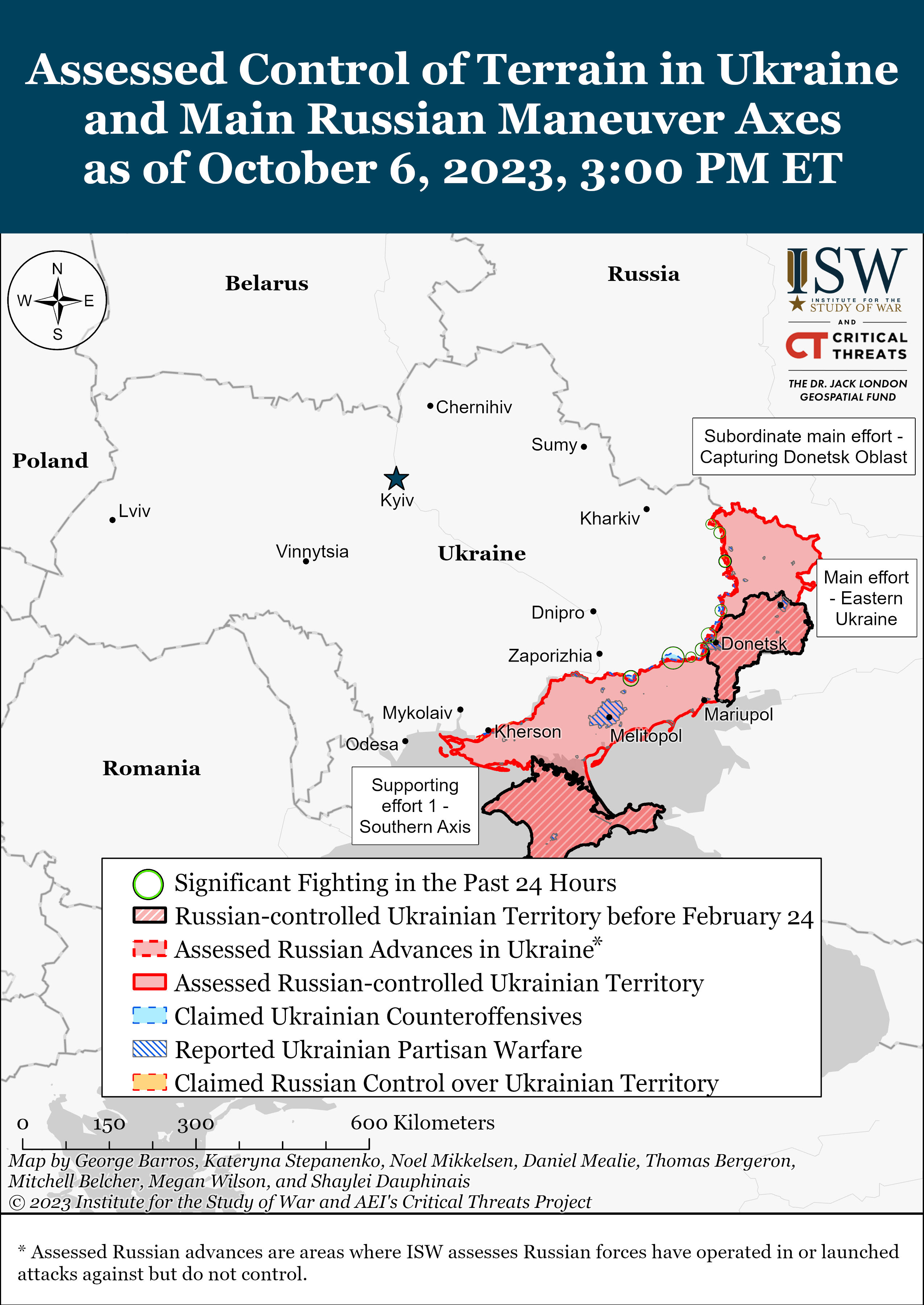
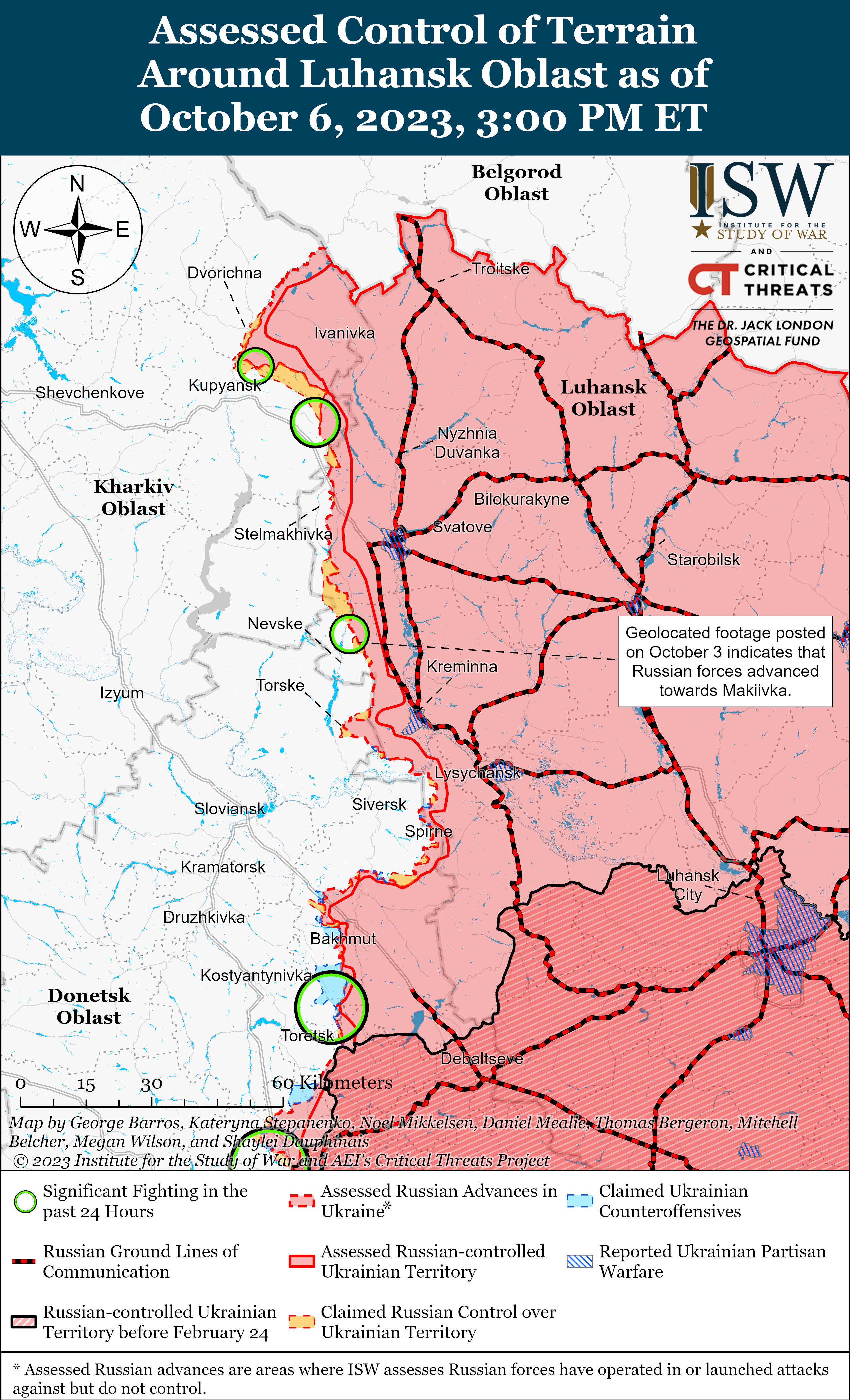
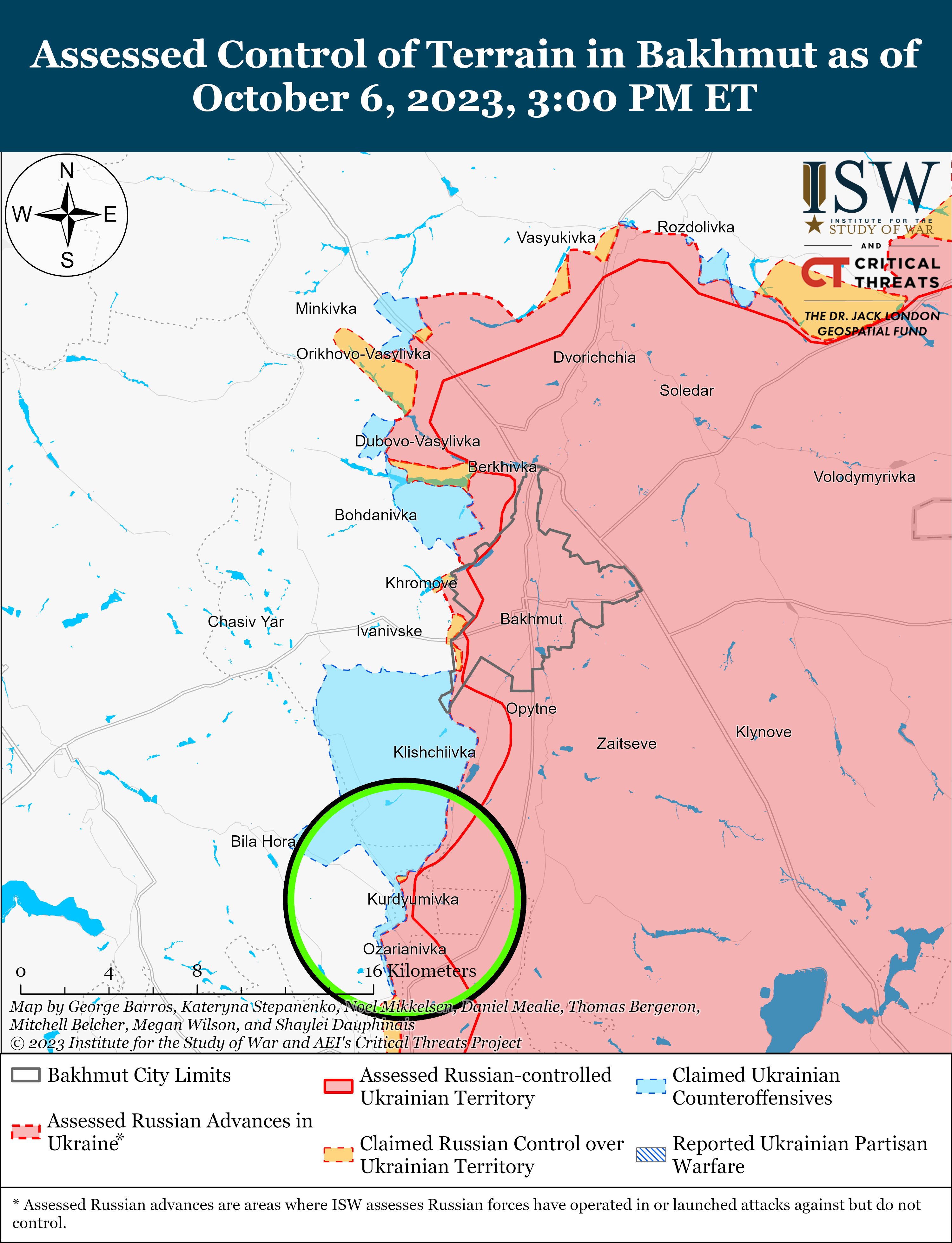
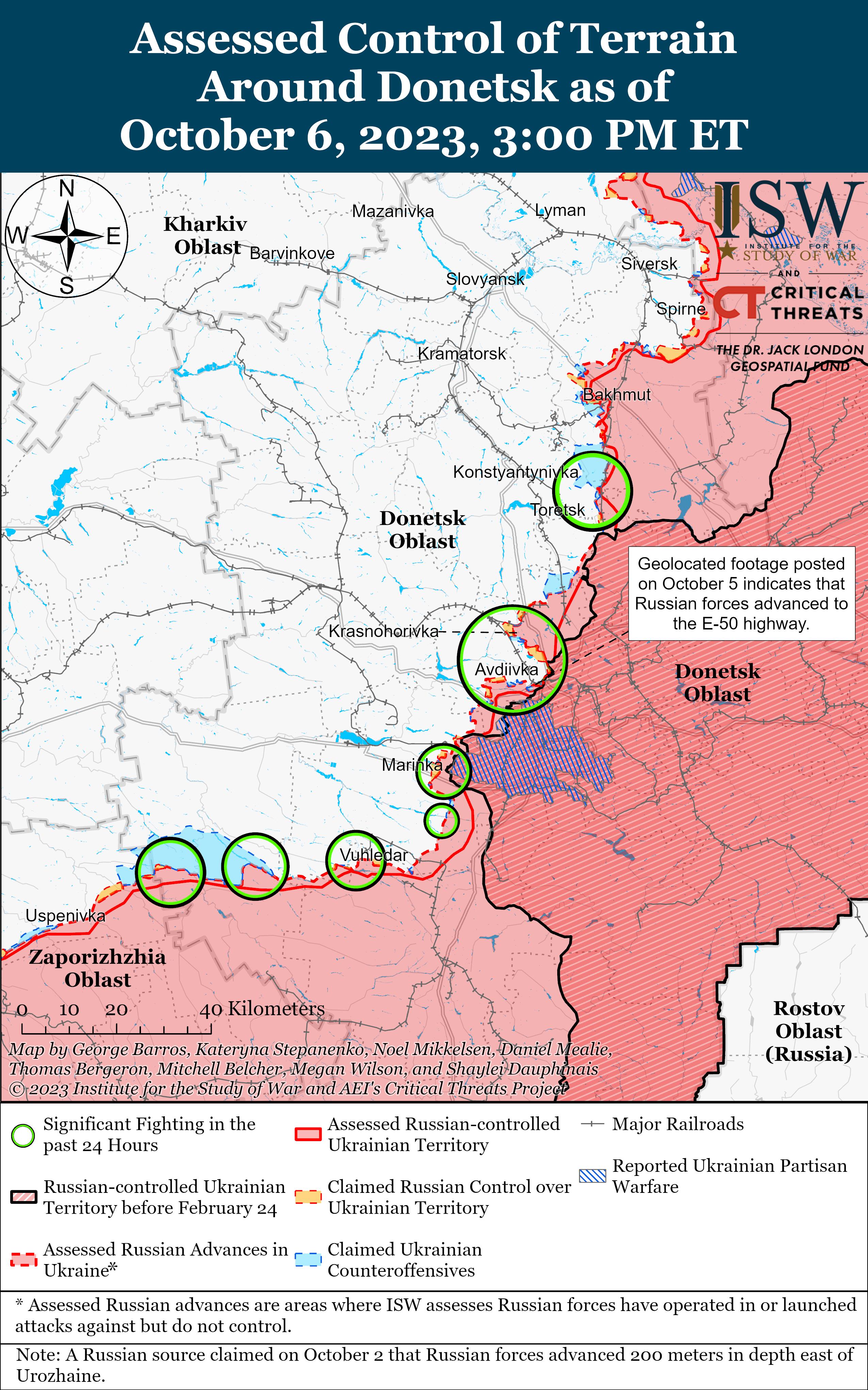
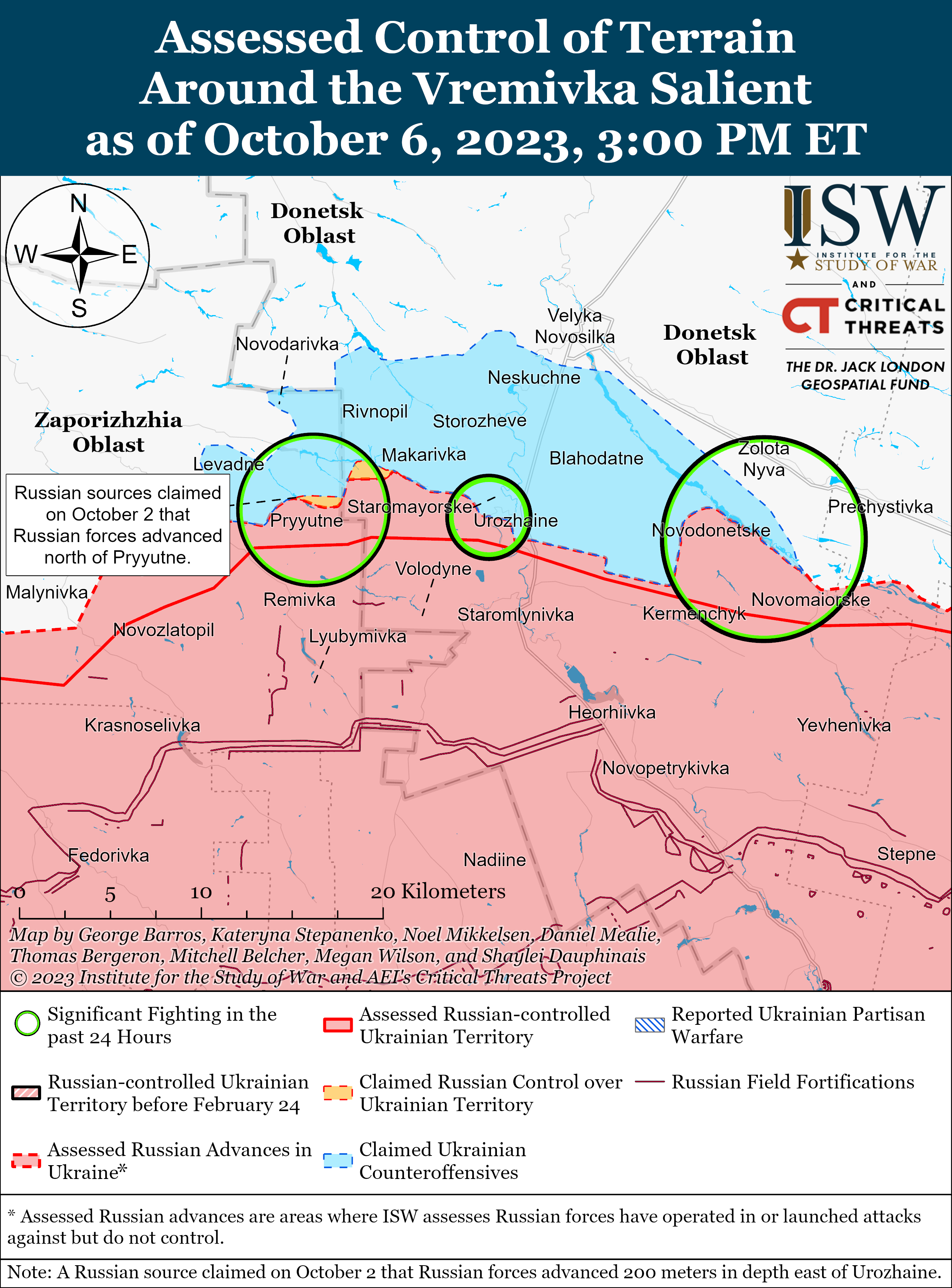
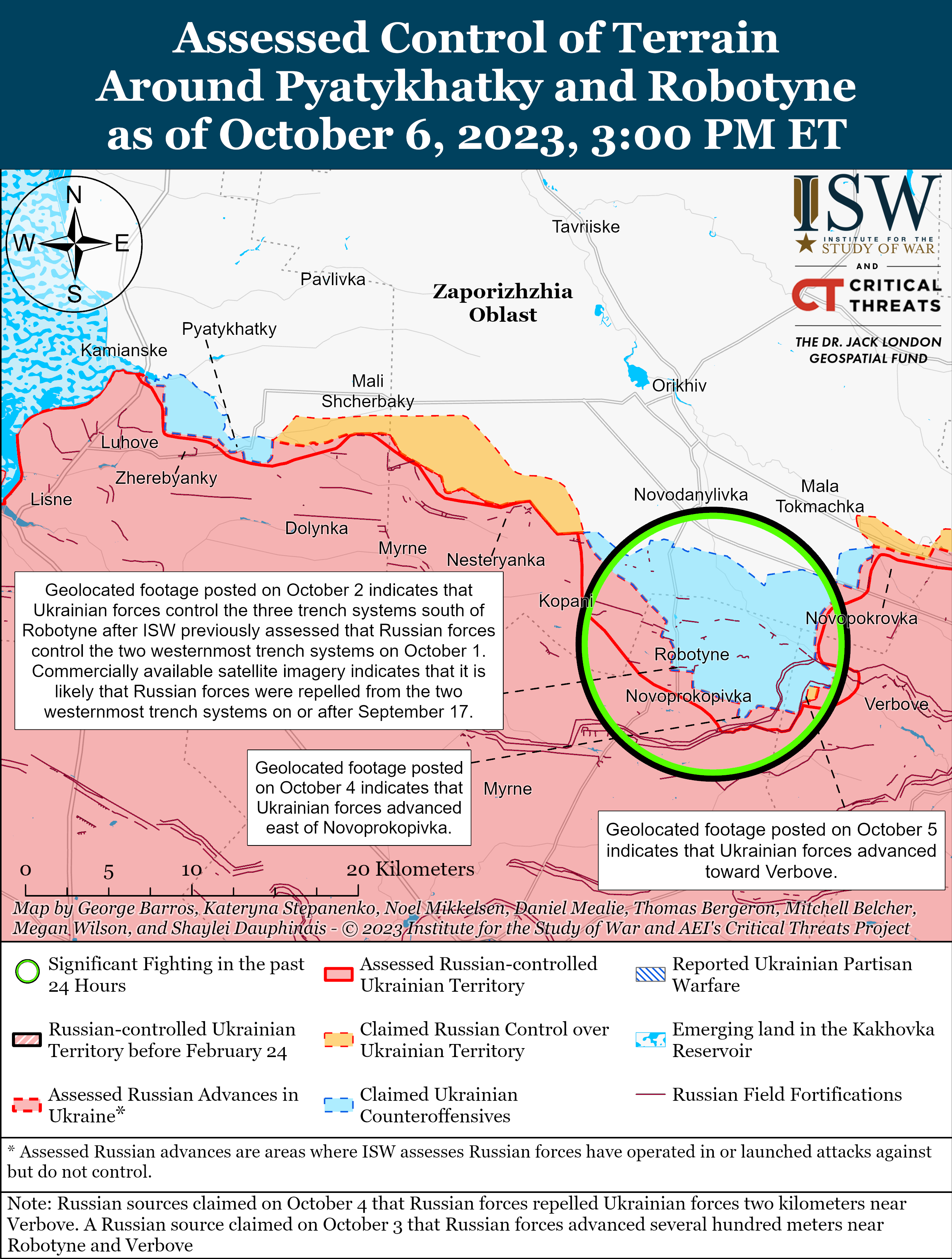
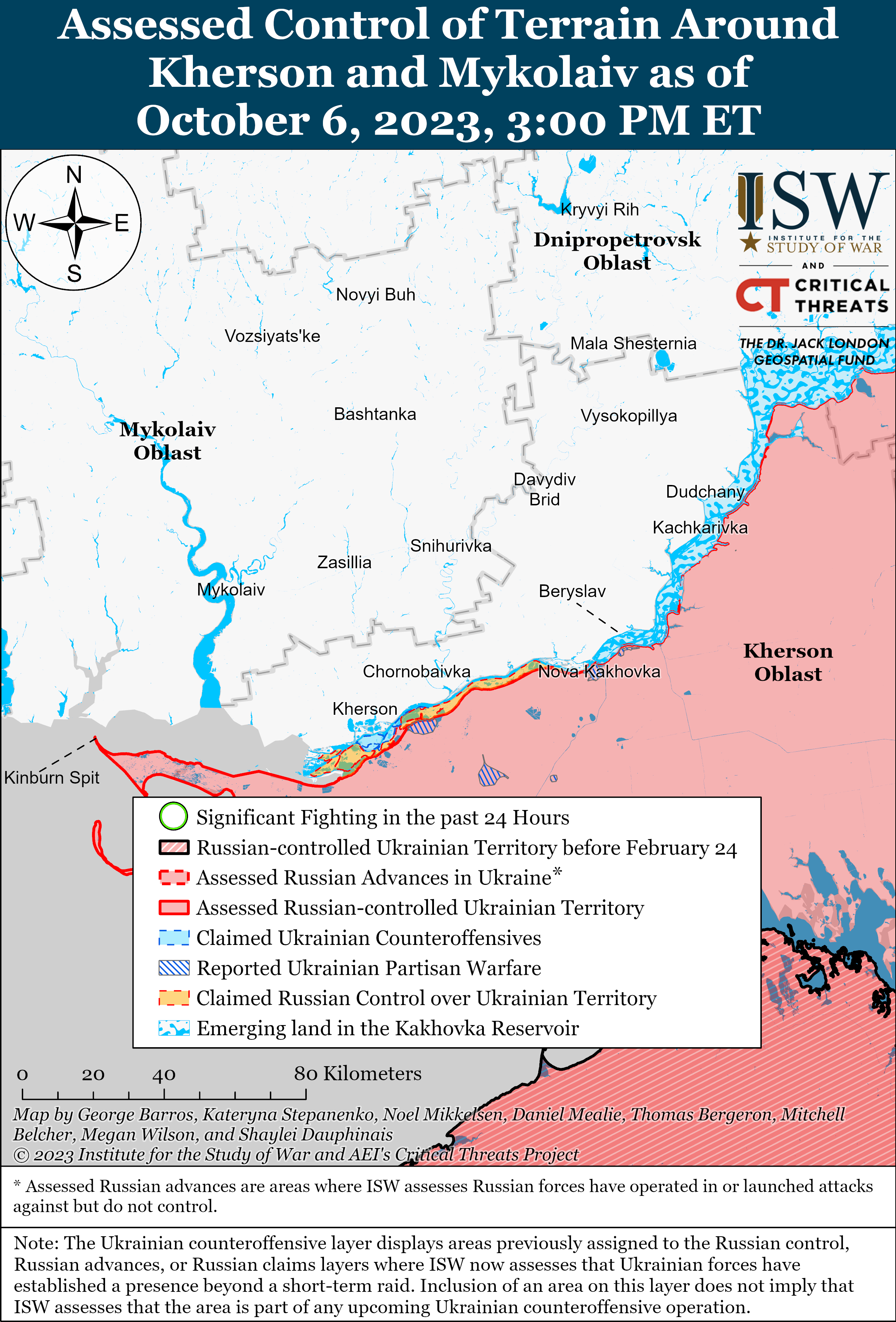
No comments:
Post a Comment